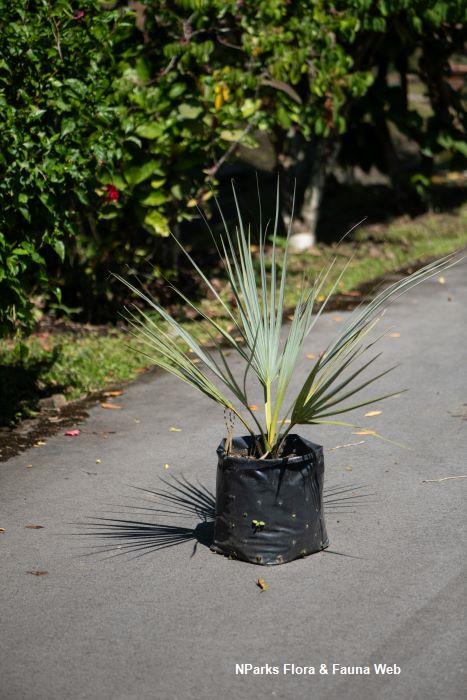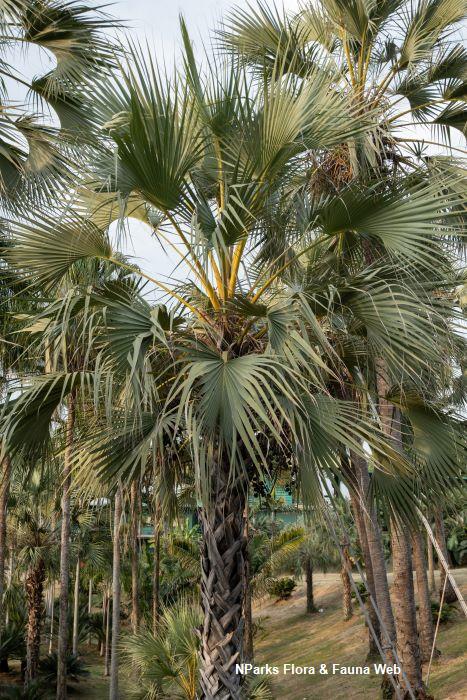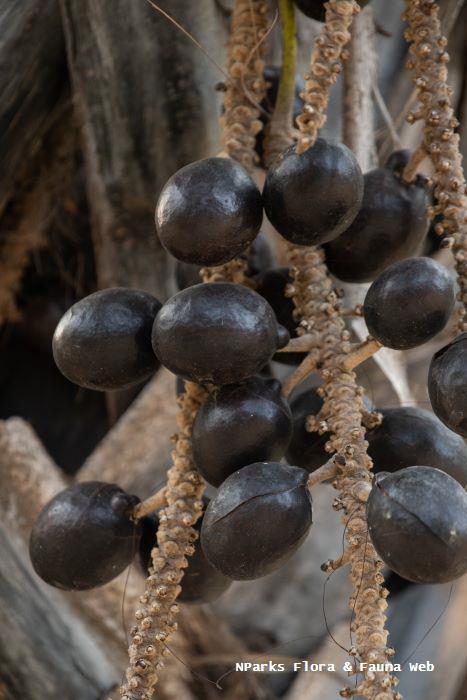
Back
Medemia argun
| Family Name: | Arecaceae (Palmae) |
| Synonyms: | Hyphaene argun Mart., Areca passalacquae Kunth, Medemia abiadensis H.Wendl. |
| Common Name: | Argun Palm, Medemia Palm, Nubian Desert Palm |
The Argun Palm (Medemia argun) is a solitary-growing palm endemic to the Nubian deserts of Egypt and Sudan. Growing up to 10 - 16 metres tall, this arid-growing palm produces fan-shaped fronds with bright yellow petioles armed with spines. This species was thought to be extinct in the late 1980s but was rediscovered in 1995.
Name
Classifications and Characteristics
| Plant Division | Angiosperms (Flowering Seed Plants) (Monocotyledon) |
|---|---|
| Plant Growth Form | Palm (Solitary Habit) |
| Lifespan (in Singapore) | Perennial |
| Mode of Nutrition | Autotrophic |
| Plant Shape | Fountain (Palm-like) |
| Maximum Height | 10 m to 16 m |
Biogeography
| Native Distribution | Egypt, Sudan |
|---|---|
| Native Habitat | Terrestrial (Desert / Semi-Desert) |
| Preferred Climate Zone | Desert / Arid |
| Local Conservation Status | Non-native (Horticultural / Cultivated Only) |
Description and Ethnobotany
| Growth Form | It is a solitary palm, up to 10 -16 m tall. |
|---|---|
| Trunk | The trunk can grow up to 0.9 - 1.1 m in diameter, sometimes covered in persistent frond bases and a skirt of dead fronds below the crown. |
| Foliage | The fronds are stiff and costapalmate, forming a fan shape. The petioles are bright yellow and lined with black outward-facing hooks. Old fronds are persistent, forming a skirt below the crown. |
| Flowers | The inflorescence is interfoliar, emerging between the fronds. The species is dioecious, with male and female flowers found on separate individuals; male flowers are smaller than female flowers and borne on catkin-like structures. |
| Fruit | The fruits are plum-shaped drupes, ripening to purple-black and surrounding a large seed. The thin flesh turns dry and wrinkled when the fruits fall. |
| Habitat | It can be found in desert oases and along dry river beds in which groundwater is likely to occur. |
| Taxonomy | Medemia argun is monotypic, meaning it is the only species in this genus. Its fruit was first discovered as an archaeological relic of the ancient tombs of Egypt in 1859. The living palm was first found in 1837 and sporadically observed throughout the 19the and 20th centuries. By the end of the 1980s, the palm was unreported for more than 30 years and was thought to be possibly extinct. The species was later rediscovered in 1995 in small, fragmented populations across Sudan. |
| Cultivation | It grows well in dry, sandy soil and under full sun conditions. Plant growth is observed to be relatively slow in tropical Singapore but fast-growing in drier climates. It can be propagated by seeds. |
| Etymology | The genus Medemia might be derived from Greek medeís, medemía, medén, "nobody", possibly referring to the desert environment where it lives. The specific name argun |
| Ethnobotanical Uses | Timber & Products: The wood from dead palms is used for cooking and for making shelter by gold miners. The fronds are used to make mats and ropes by the Bedouins. |
Landscaping Features
| Desirable Plant Features | Ornamental Form |
|---|---|
| Thematic Landscaping | Rockery / Desert Garden |
Plant Care and Propagation
| Light Preference | Full Sun |
|---|---|
| Water Preference | Little Water |
| Plant Growth Rate | Moderate to Slow |
| Rootzone Tolerance | Well-Drained Soils, Drought Tolerant |
Foliar
| Foliage Retention | Evergreen |
|---|---|
| Mature Foliage Colour(s) | Green, Yellow / Golden |
| Foliar Type | Compound (Palmate) |
| Foliar Arrangement Along Stem | Spiral |
| Foliar Attachment to Stem | Petiolate |
| Foliar Shape(s) | Palm Fronds (Fan / Costapalmate) |
| Foliar Venation | Palmate |
| Leaf Area Index (LAI) for Green Plot Ratio | 2.5 (Palm - Solitary) |
Non - Foliar and Storage
| Trunk Type (Palm) | Aboveground, Solitary Habit |
|---|---|
| Root Type | Underground (Fibrous Root) |
Floral (Angiosperm)
| Flower & Plant Sexuality | Unisexual Flowers , Dioecious |
| Flower Grouping | Cluster / Inflorescence |
|---|
| Flower Location | Axillary |
| Inflorescence Type | Panicle |
| Ovary Position | Superior / Hypogynous |
| Flowering Habit | Polycarpic |
Fruit, Seed and Spore
| Mature Fruit Colour(s) | Black |
|---|---|
| Mature Fruit Texture(s) | Smooth |
| Fruit Classification | Simple Fruit |
| Fruit Type | |
| Seed Quantity Per Fruit | Few (1-5) |
References
| References | Ali, O.M.M. (2016). The Argun Palm, Medemia argun, in the Eastern Nubian Desert of Sudan. Palms, Vol. 60(3); 145-153. Ibrahim, H. & Baker, W. (2009). Medemia argun–Past, Present and Future. Palms, Vol 5391). 9-19. |
|---|
Image Repository
Others
| Master ID | 34263 |
|---|---|
| Species ID | 8676 |
| Flora Disclaimer | The information in this website has been compiled from reliable sources, such as reference works on medicinal plants. It is not a substitute for medical advice or treatment and NParks does not purport to provide any medical advice. Readers should always consult his/her physician before using or consuming a plant for medicinal purposes. |


